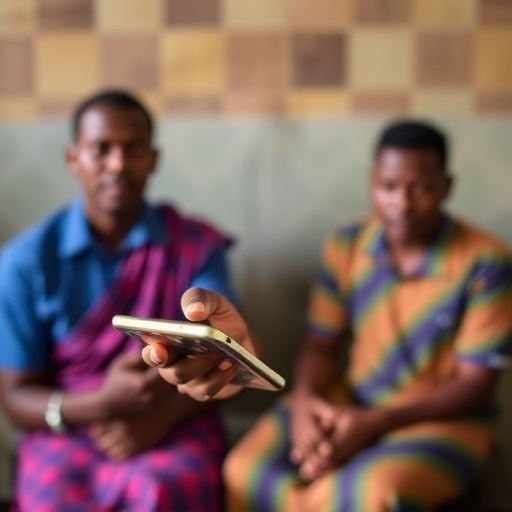A pioneering clinical trial has demonstrated that the integration of a mobile application, Med Safety, into Uganda’s national pharmacovigilance system markedly enhances the reporting of suspected adverse drug reactions (ADRs) by healthcare professionals. Published in the prestigious journal The Lancet Global Health, these findings represent a significant advancement in the utilization of digital health tools to address long-standing challenges in pharmacovigilance, particularly in low- and middle-income countries (LMICs) where under-reporting of medicine-related harms has historically compromised patient safety.
This landmark study was conducted as a cluster-randomized controlled trial spanning 367 health facilities and involving more than 2,400 healthcare workers across Uganda. The large-scale nature of the trial underscores its robustness and the relevance of its outcomes. By directly comparing traditional pharmacovigilance reporting methods with those augmented by the Med Safety app, researchers could quantitatively evaluate the app’s impact within real-world clinical environments. The integration of digital tools like Med Safety holds promise to revolutionize the way spontaneous ADR reporting is conducted, enabling more timely and comprehensive data collection.
Healthcare professionals utilizing the Med Safety smartphone application reported an impressive 73% increase in suspected ADR submissions overall compared to those relying solely on pre-existing, paper- or web-based systems. Even more striking was the near doubling of reports linked to dolutegravir, a cornerstone antiretroviral medication widely used in HIV treatment programs. This enhanced reporting provides critical insight into both serious and non-serious adverse events, vital for constructing a nuanced understanding of drug safety profiles and informing clinical and regulatory decision-making in resource-constrained settings.
The technical sophistication of the Med Safety app underpins its impact. Originally developed through the European Innovative Medicines Initiative’s flagship WEB-RADR project and subsequently deployed in multiple countries, Med Safety is engineered to be user-friendly and accessible on smartphones, allowing frontline healthcare workers to quickly and accurately input suspected ADRs. This technology addresses many barriers inherent in traditional pharmacovigilance systems, such as cumbersome paperwork, delayed transmissions, and limited real-time data aggregation, which together contribute to the chronic under-reporting widely observed in LMICs.
Dr Ronald Kiguba, Chief Investigator for the trial and a leading African Research Leader funded by the UK Medical Research Council (MRC), emphasized the transformative potential of digital pharmacovigilance tools. He highlighted that Med Safety exemplifies how mobile health (mHealth) technologies can bridge systemic gaps in ADR detection and reporting. By harnessing the ubiquity of smartphones and tailored digital interfaces, such applications empower healthcare workers to contribute directly to national pharmacovigilance databases, enhancing both data quality and volume.
Professor Sir Munir Pirmohamed, David Weatherall Chair of Medicine at the University of Liverpool, underscored the challenges facing current spontaneous ADR reporting systems, which often suffer from severe under-reporting and delayed communication. He endorsed the trial’s demonstration that mobile applications can substantially augment ADR reporting frequencies and suggested that digital interventions are poised to become indispensable tools in global pharmacovigilance strategies.
The success of Med Safety in Uganda provides crucial empirical validation not only for existing digital health initiatives but also sets a precedent for other LMICs seeking scalable solutions to bolster medicine safety monitoring. The ability to capture a more comprehensive spectrum of ADRs — including mild reactions that rarely reach national databases — enriches pharmacovigilance datasets, facilitating more precise epidemiological surveillance and evidence-based regulatory actions.
In the context of HIV treatment, where medications such as dolutegravir are heavily prescribed, the relevance of vigilant safety monitoring cannot be overstated. Early identification and reporting of adverse drug reactions can mitigate risks for patients and inform clinicians about necessary contraindications or management strategies. The doubling of dolutegravir-linked ADR reports within the Med Safety user cohort exemplifies the application’s sensitivity and clinical utility.
Moreover, the implications of digital pharmacovigilance extend beyond individual countries. Real-time data accumulation via apps like Med Safety can contribute to regional safety monitoring and global pharmacovigilance networks, enhancing the collective capacity to detect rare or emergent ADR patterns. This collaborative dimension supports proactive risk assessment and facilitates the dissemination of early warning signals about potentially harmful drug effects.
Funding for the trial was secured through an international collaboration involving the UK Medical Research Council, Makerere University’s Research & Innovations Fund, and Uganda’s National Drug Authority, reflecting a concerted commitment to strengthening pharmacovigilance infrastructure. Such partnerships highlight the critical role of cross-institutional collaborations in driving forward innovative public health interventions.
Launched nationally in Uganda since 2020, Med Safety’s deep integration within the country’s existing pharmacovigilance framework ensures that digital reporting acts as an adjunct rather than a replacement, streamlining workflows while maintaining coherence with established regulatory processes. This approach preserves the integrity of national pharmacovigilance systems while modernizing their capabilities for the 21st-century healthcare landscape.
In conclusion, the groundbreaking trial’s results herald a new era for pharmacovigilance in LMICs, powered by mHealth solutions that substantially increase the detection and reporting of ADRs. By leveraging scalable, digital tools, countries like Uganda are better equipped to make data-driven regulatory decisions, safeguard patient populations, and improve the overall quality of care. The Med Safety app exemplifies how innovation in digital health can be operationalized effectively, turning the tide against previously intractable challenges in medicine safety monitoring.
Subject of Research: Pharmacovigilance enhancement through mobile applications; Adverse drug reaction reporting in low- and middle-income countries.
Article Title: “Adverse Drug Reaction Reporting with the Med Safety App in Uganda: A Cluster-Randomised Controlled Trial”
News Publication Date: 17 September 2025
Web References:
https://www.sciencedirect.com/science/article/pii/S2214109X25002992
Keywords: Drug therapy, Pharmacology, Drug interactions




